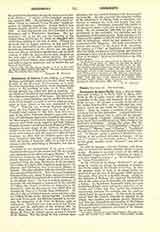

Desiderius of Cahors, Saint, Bishop, b. at Obrege (perhaps Antobroges, name of a Gaulish tribe), on the frontier of the Provincia Narbonnensis, of a noble Frankish family from Aquitaine, which possessed large estates in the territory of Albi; d. November 15, 655—though Krusch has called this date in question. In his childhood Desiderius was profoundly impressed by the religious atmosphere of his home. His father Salvius was a pious Christian, and his mother Herchenefreda shows herself a woman of serious religious sentiment in three letters to her son, mentioned in his “Vita”. With his two brothers, Rusticus and Syagrius, the boy Desiderius came to the court of the Frankish king Chlotar II (584-629; from 613 sovereign of the whole Frankish Empire), and with other boys of noble family received an excellent education at the Merovingian court-school, whence in the seventh century went forth many capable and holy bishops. Rusticus became a priest and finally Bishop of Cahors; Syagrius became count of the territory of Albi and prefect of the city of Marseilles; Desiderius stayed on at the court where he held the important office of royal treasurer, an office that he retained under the new king, Dagobert (629-639), whose confidant he was. After the death of Syagrius (629), he is said to have obtained also the prefectship of Marseilles, but this is not certain.
Faithful to the admonitions of his pious mother, Desiderius led at court the serious holy life of a monk, and administered his office with great fidelity. In 630 his brother Rusticus, the Bishop of Cahors, was murdered, whereupon the clergy and people of that city requested from the king Desiderius as his successor. By a letter of April 8, 630, Dagobert made known his consent, and Desiderius was consecrated Bishop of Cahors. His close relations with the Court he used in the interests of his Church. With the most important bishops of his time, many of them educated with him at the royal court, he maintained an active intercourse, as his letters prove. He was a zealous promoter of monastic life and founded a monastery in the vicinity of Cahors, the church of which was dedicated to St. Amantius; later on the convent was called after its founder, St. Gery (i.e. Dierius, from Desiderius). He directed also a convent of women, as we see from a letter written by him to the Abbess Aspasia. Under him and with his support was likewise founded in his diocese the monastery of St. Peter of Moissae, later so celebrated. Desiderius was very zealous for Divine service and the perfection of the religious life; he built three large basilicas in and near Cahors (St. Maria, St. Peter, St. Julian) and an oratory in honor of St. Martin. For the clergy he was a severe disciplinarian, but was himself foremost with the example of a holy life. He also promoted the temporal welfare of the inhabitants of Cahors, built an aqueduct, and erected or restored the walls and towers that protected the city. Desiderius persuaded the nobles of his diocese to endow richly the churches and monasteries. By his testament (649-650) he gave all his possessions to the cathedral, the churches, and the monasteries of his episcopal city. While resident on his estates in the district of Albi he fell ill and died at his villa of Wistrilingo, which he had presented to the monastery of St. Amantius. His body was carried to Cahors and interred in the church of St. Amantius. We possess a “Vita” of Desiderius written shortly after his death, a collection of his letters, also of letters addressed to him, and an account of miracles that took place at his tomb. His feast is celebrated on the 15th of November.
J. P. KIRSCH

